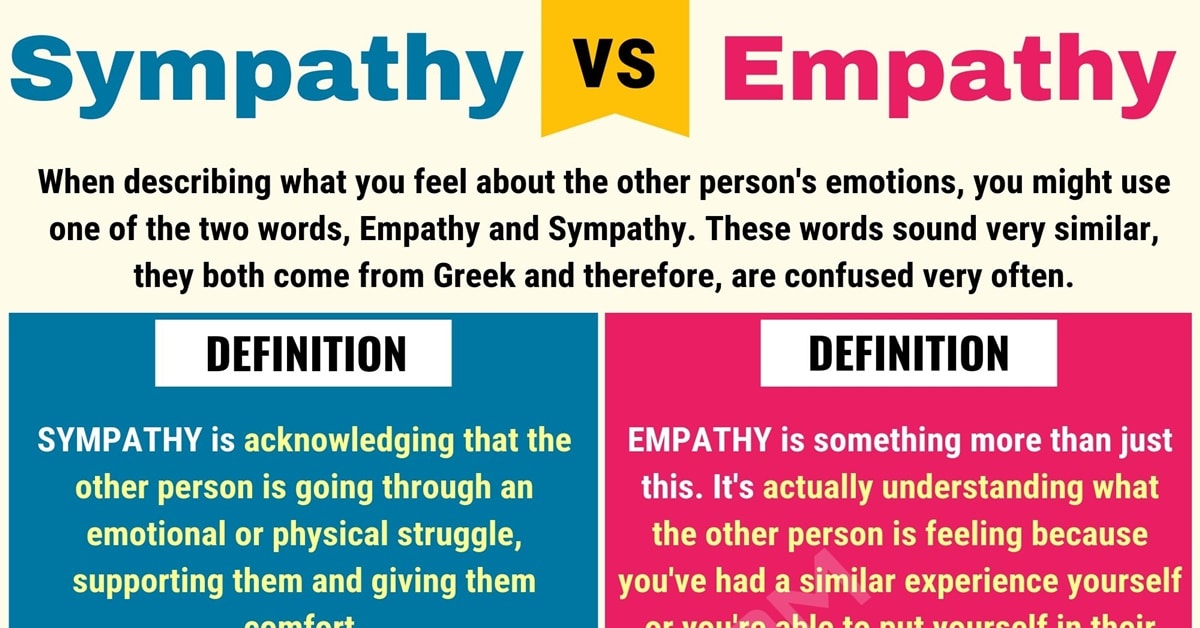Difference between empathy vs. sympathy. When describing what you feel about the other person’s emotions, you might use one of the two words, empathy vs. sympathy. These words sound very similar, they both come from Greek and therefore, are confused very often. Still, they aren’t synonyms, and they can’t replace one another in a sentence. But what’s the difference?
Empathy vs. Sympathy
- SYMPATHY is acknowledging that the other person is going through an emotional or physical struggle, supporting them and giving them comfort.
- EMPATHY is something more than just this. It’s actually understanding what the other person is feeling because you’ve had a similar experience yourself or you’re able to put yourself in their shoes.
Examples:
- The nurse should try to develop empathy between herself and the patient.
- I have no sympathy for Jan, it’s all her own fault.
When to Use Sympathy vs. Empathy
Both sympathy and empathy are heartfelt and honest feelings but empathy is a deeper one. When you express sympathy, you realize that someone is feeling sad or depressed but when you express empathy, you actually feel exactly what the other person is feeling.
For instance, when a doctor provides comfort to a sick patient and his family, he is being sympathetic. But when a doctor supports the family of a patient because he himself has a relative who’s suffering from the same illness, what he’s feeling is best described as empathy.
People who are going through difficult times can receive both empathy and sympathy from people around them. However, these feelings don’t necessarily go together. One other example is a person who has lost a loved one. This person will obviously receive a lot of compassion, support, and sympathy from his friends and family. But only those of his friends who have been in the same situation and lost someone as well will be able to be empathetic.
If you’re a science fiction fan, it will probably be easier for you to remember what’s the difference between sympathy and empathy. Maybe in one of your favorite books or movies you’ve read or heard something about empathy: the paranormal ability to read the emotions of a different person. After all, reading someone else’s emotions and putting yourself in their shoes is pretty much the same thing, and it’s empathy, not sympathy, that describes both of them.
Empathy vs. Sympathy Examples
- It is important to develop empathy between dogs and their handlers.
- She had a deep empathy for animals.
- They could combine their compassion and empathy with being helpful.
- As you increase the limit setting, you need to increase your empathy.
- Their eyes are large with concern and empathy, and everywhere there are enfolding arms.
- A qualified career counselor can extend greater empathy to their clients.
- In every case, the need for empathy and positive regard is greatly increased.
- She expressed her sympathy to the bereaved family.
- She never expressed any sympathy when I was injured.
- I must confess I have some sympathy for his views.
- There was no personal sympathy between them.
- The President has offered his sympathy to the Georgian people.
- He wants to express his deep sympathy to the Humphreys family.
- I don’t want your sympathy!
How to Use Sympathy vs. Empathy Correctly | Picture
Empathy vs. Sympathy – Difference between Empathy vs. Sympathy









0 Comments